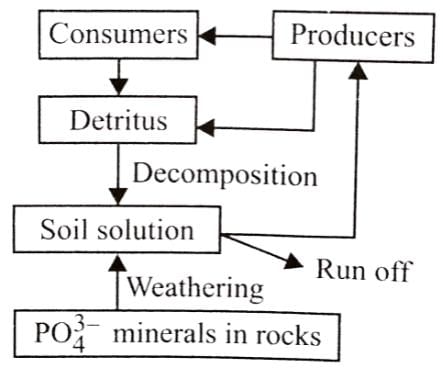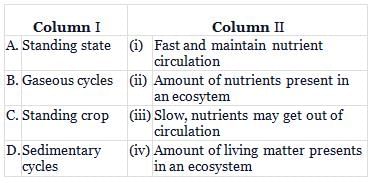Test: Nutrient Cycling (NCERT) - NEET MCQ
10 Questions MCQ Test Biology Class 12 - Test: Nutrient Cycling (NCERT)
Read the given statements and select the correct option.
Statement 1: Major reservoirs of phosphorus are phosphate rocks and fossil bone deposits laid down in the past geological ages.
Statement 2: During weathring of rocks, minute amounts of these phosphates dissolve in soil solution and are absorbed by the roots of the plants.
Statement 1: Major reservoirs of phosphorus are phosphate rocks and fossil bone deposits laid down in the past geological ages.
Statement 2: During weathring of rocks, minute amounts of these phosphates dissolve in soil solution and are absorbed by the roots of the plants.
Select the pairs of sedimentary biogeochemical cycles.
I. Hydrogen cycle and water cycle
II. Phosphorus cycle and sulphur cycle
III. Calcium cycle and magnesium cycle
IV. Carbon cycle and nitrogen cycle
I. Hydrogen cycle and water cycle
II. Phosphorus cycle and sulphur cycle
III. Calcium cycle and magnesium cycle
IV. Carbon cycle and nitrogen cycle
| 1 Crore+ students have signed up on EduRev. Have you? Download the App |
Which one of the following is not one of the three aspects studied in biogeochemical cycling?
Study the given flow chart and select the correct statement regarding this.

(i) It represents phosphorus cycling in a terrestrial ecosystem.
(ii) It represents phosphorus cycling in an aquatic ecosystem.
(iii) Natural reservoir of phosphorus is phosphate rocks.
(iv) There is no respiratory release of phosphorus into atmosphere.
(v) Gaseous exchange of phosphorus between organisms and environment occurs to a considerable extent.
Match column I with column II and select the correct option from the given codes.

Which one of the following is not a gaseous biogeochemical cycle in ecosystem?
Read the given statements and select the correct option.
Statement 1: Global water cycle does not involve the living organisms.
Statement 2: In this cycle, water circulates between hydrosphere and atmosphere.
Which of the following is most important in water cycle?
|
78 videos|276 docs|174 tests
|

















